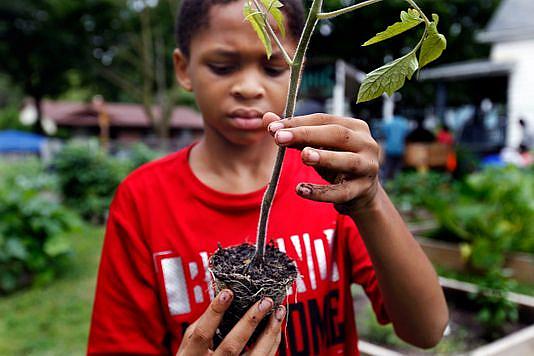Want to get involved in a community garden? It's not all weed-pulling.
James E. Causey’s reporting on this project was completed with the support of a USC Annenberg Center for Health Journalism grant.
Other stories in this series include:
I returned to the 53206 neighborhood — and saw some boys turn into men
In Milwaukee's poorest ZIP code, fruits and vegetables become powerful weapons for saving young boys
How a Milwaukee community garden helped turn a struggling boy into 'Lil Obama'
Milwaukee couple make it their mission to give trauma victims the chance to talk and be heard
A reporter shares lessons from a Milwaukee garden trying to save at-risk boys

Emmanuel Johnson, 12, prepares the roots of a tomato plant at the "We Got This” urban garden in July. Emmanuel helped plant a dozen tomato plants in a program that offers black boys mentorship with adults. The group’s founder, Andre Lee Ellis, said his goal is to get young men to take their hands off the trigger and put them into the dirt.
(Photo Credit: Angela Peterson/Milwaukee Journal Sentinel)
The community garden at the center of Andre Lee Ellis' "We Got This" mentoring program is one of dozens in Milwaukee.
Many could use help — from raising money to sweat equity. If you want to help a community garden, here are some ways you can get involved:
1. The key to sustaining any community garden is volunteers. Most gardens welcome volunteers who are eager to get their hands dirty, from planting seeds to pulling weeds.
• To find a community garden close to you in the Milwaukee area, go to: http://www.groundworkmke.org/milwaukee-urban-gardens/.
• More info on "We Got This" is here.
2. Grow compost by collecting your food scraps, autumn leaves and dried grass clippings. Either compost in your backyard and donate it or gather the materials that can be used for a compost and have it delivered to a garden that has composting. To grow organic compost takes three to six months and it’s often referred to as “black gold” because the material is rich for growing. The timing is based on how warm the materials can get. You can purchase compost bins locally by going to Keep Greater Milwaukee Beautiful at https://www.kgmb.org/staff/, or call (414) 272-5462.
3. Come and sit. Read. Stretch and be a part of the actual community. Don’t just come and leave. Find out the concerns of the community and be a part of the conversation. Gardens are not looking for saviors, but they are looking for authentic partnerships.
4. Unfortunately, thefts are common in community gardens. Tools are often the first thing stolen. Before you donate, visit the garden and find out what the needs are.
5. Donate perennial herbs such as lavender, yarrow, catmint and sage. These attract bees to the garden, which are one of the best pollinators. Without pollinators you won’t have food.
6. Help build a beehive. Bees bring several positives. They are the main pollinators. They also produce honey and wax for candles that some community garden organizers sell to raise money for the garden. Milwaukee County University of Wisconsin-Extension offers bee keeping and training. To sign up for beekeeping certification, call Linda Reynolds at (414) 615-0530 or email her at linda.reynolds@ces.uwex.edu.
[This story was originally published by Journal Sentinel.]

